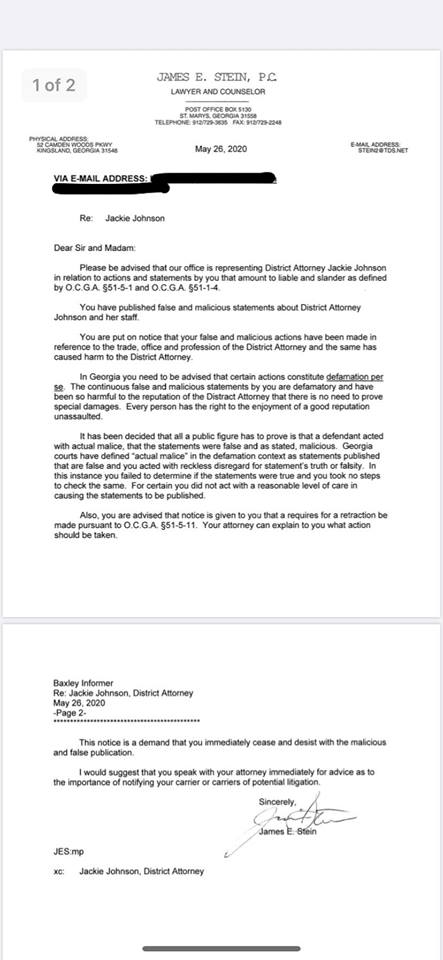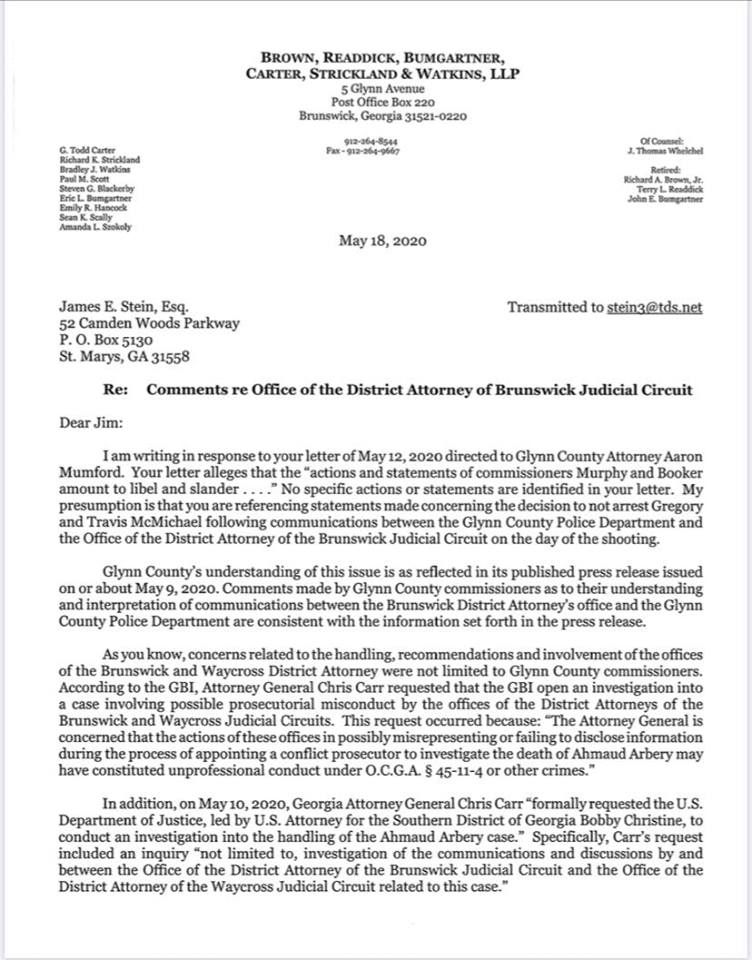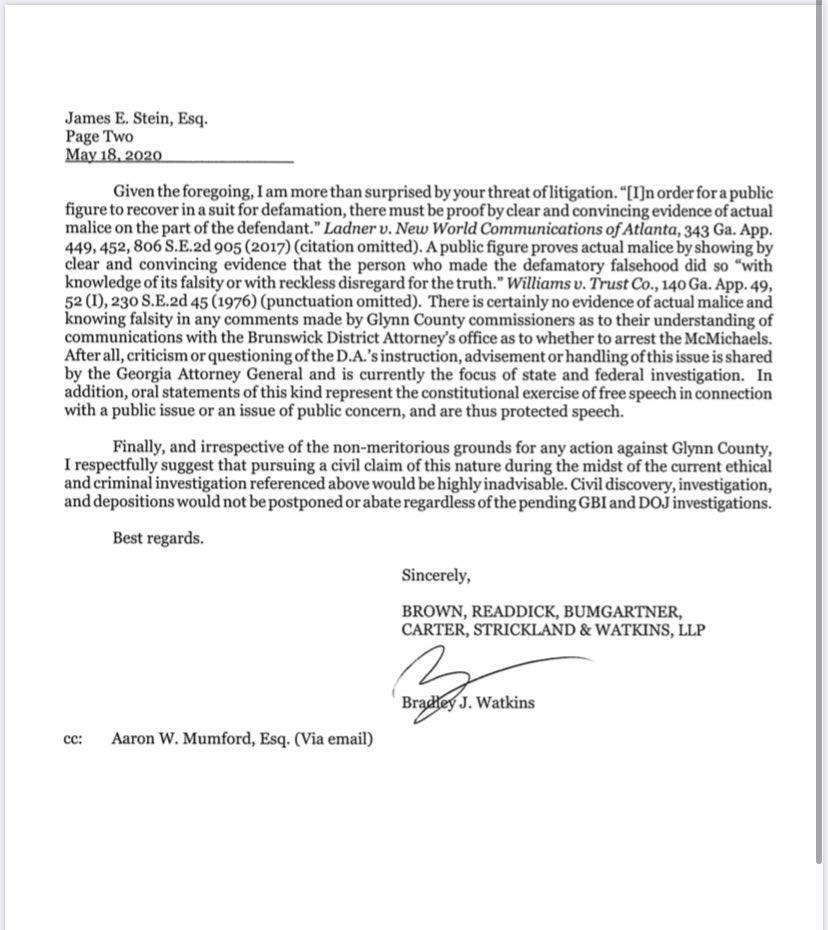
The South Georgia district attorney embroiled in a public affairs nightmare fueled by a viral video, an angry constituency, and a tenure of political favor is now taking aim at the media.
Brunswick Judicial Circuit District Attorney Jackie Johnson, whose title has become a household name across the nation due to her office’s handling of the Ahmaud Arbery case, is not letting an investigation into her office by both the Georgia Bureau of Investigation and the U.S. Department of Justice get in the way of her reputation. According to Johnson’s attorney, as district attorney, she has the “the right to the enjoyment of a good reputation.” And, apparently, that is the premise of the threats for legal action against an online publication for reports made about her handling of cases.
According to the May 26th letter to the Baxley Informer, Johnson is of the belief that false and malicious statements have been made in reference to the trade, office, and profession of the District Attorney. The Baxley Informer is an online ‘news and opinion blog,’ according to the website itself and a fairly new one at that, having been created earlier this spring with details of an employee matter at Meadows Hospital in Vidalia and other stories on the Brunswick Judicial Circuit (which encompasses Appling, Camden, Glynn, Jeff Davis, and Wayne counties).
The letter was written to the Baxley Informer by Kingsland attorney James E. Stein, who said the actions have ‘caused harm.’
“The continuous false and malicious statements by you are defamatory and have been so harmful to the reputation of the District Attorney that there is no need to prove special damages,” the letter reads. It further states that the actions and statements by the Baxley Informer amount to “liable and slander as defined by O.C.G.A. 51-5-1 and OCGA 51-1-4.
But Stein makes no direct reference to any statements in particular made by the Baxley Informer, only that the publisher should retract statements, cease and desist making other such statements, and speak with an attorney for further advice. You can read the letter in its entirety below.
Aside from the lacking specifics by Stein as to what statements were not only malicious but also untrue, Stein references ‘liable,’ a term not found in either code section referenced. For the purposes of this article, AllOnGeorgia has made the assumption that Stein meant ‘libel,’ which according to OCGA § 51-5-5 (2018) is a civil matter relating to defamation requiring both malice and proof. The second code section referenced by Stein merely details Georgia’s parameters for demanding a retraction where libel is alleged, but since no specifics were mentioned, it would be difficult for the Baxley Informer to offer a retraction on a statement believed to be false.
Furthermore, Stein states that there is “no need to prove special damages” while claiming Johnson has been harmed, but the code section Stein referenced says a publication can only be held liable (not libel) for actual damages. Without proof, without citation of damages, and without an outline of malice, the letter threatening the new – and, albeit small – publication appears to be more bloviation than justified by legal standards.
It is not uncommon for elected officials to threaten legal action against media outlets due to less-than-favorable coverage, but the courts have routinely ruled in favor of the free press and the First Amendment, particularly when the articles are opined as ‘opinion.’ The standard for freedom of speech is even higher when the publication details a public official.
In the infamous New York Times v. Sullivan case from 1964, the court ruled that:
When a statement concerns a public figure, it is not enough to show that it is false for the press to be liable for libel. Instead, the target of the statement must show that it was made with knowledge of or reckless disregard for its falsity. Brennan used the term “actual malice” to summarize this standard, although he did not intend the usual meaning of a malicious purpose. In libel law, “malice” had meant knowledge or gross recklessness rather than intent, since courts found it difficult to imagine that someone would knowingly disseminate false information without a bad intent.
Johnson also used Stein to send a cease and desist letter to Glynn County Commissioners after their commentary on the handling of the Arbery case. The attorney for the commissioners, in refuting all of Stein’s claims for libel, slander, and defamation, offered unsolicited advice and suggested that Johnson not pursue a civil claim during an ethics and criminal investigation due to the fact that depositions and civil discovery would not be postponed simply due to an ongoing GBI and DOJ investigation. That letter is below as well.
Because Stein referenced representing Johnson as ‘District Attorney Jackie Johnson’ in her official capacity, AllOnGeorgia has filed an Open Records Request with the district attorney’s office for any and all legal expenses paid by the office in the last 60 days. Once that information is made available, it will be published here.
First is the letter to the Baxley Informer. Second (in 2 pictures) is the letter from the Glynn County Commissioner’s attorney TO the attorney for Jackie Johnson.
Jessica Szilagyi is a former Statewide Contributor for AllOnGeorgia.com.

2 Comments
Leave a Reply
Cancel reply
Leave a Reply

Bulloch Public Safety
03/04/2026 Booking Report for Bulloch County

Chattooga Local News
Oversight Committee Releases Bill and Hillary Clinton Deposition Videos

Chattooga Local Government
Fallen Heroes: Four Army Reserve Soldiers Die in Kuwait Drone Strike

Bulloch Public Safety
02/09/2026 Booking Report for Bulloch County

Bulloch Public Safety
02/16/2026 Booking Report for Bulloch County

Bulloch Public Safety
02/20/2026 Booking Report for Bulloch County

Bulloch Public Safety
03/02/2026 Booking Report for Bulloch County

Bulloch Public Safety
02/17/2026 Booking Report for Bulloch County










Gilbert Ellis Jr
May 27, 2020 at 7:04 pm
Just curious, should a cease and desist order be hand delivered from a Magistrate court?
Cam
May 28, 2020 at 4:32 pm
So. A whole lot of nonsensical redneck transcription.